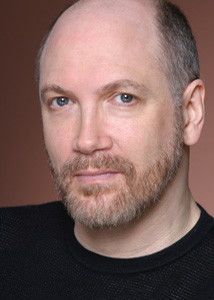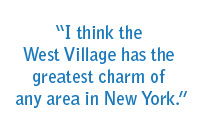 Actor, playwright, novelist, screenwriter, and gender-illusionist Charles Busch’s first hit, “Vampire Lesbians of Sodom,” opened at the Provincetown Playhouse in 1985 and ran for five years. Since then he wrote such plays as “The Lady in Question,” “Red Scare on Sunset,” “The Tale of the Allergist’s Wife,” and “The Divine Sister,” co-wrote the musical “Swingtime Canteen,” and wrote the screenplay for “Psycho Beach Party.”
Actor, playwright, novelist, screenwriter, and gender-illusionist Charles Busch’s first hit, “Vampire Lesbians of Sodom,” opened at the Provincetown Playhouse in 1985 and ran for five years. Since then he wrote such plays as “The Lady in Question,” “Red Scare on Sunset,” “The Tale of the Allergist’s Wife,” and “The Divine Sister,” co-wrote the musical “Swingtime Canteen,” and wrote the screenplay for “Psycho Beach Party.”
“I’m a true New Yorker, born in Mt. Sinai Hospital,” says writer and actor Charles Busch. “When I was born we were living in the Fleetwood section of The Bronx. Then we moved to Hartsdale in Westchester and I lived there until I was about 12. At that point my Aunt Lillian adopted me and took me to live with her in Murray Hill.”
It turned out Busch’s Aunt Lillian was a woman of great insight. “She totally got who I was, what my strengths were,” he reminisces. “Parents often have a fantasy of what they want their children to be but with my aunt, I think no matter what my interests were, she would’ve done everything she could to cultivate them. She took great pleasure in helping me pursue theatre, writing, acting, and even drawing. She sent me to every kind of class. I really had everything going for me.”
Busch attended the High School of Music and Art in the City and then left for Chicago to attend Northwestern University. It was there that he realized his career path was not going to be what he thought it might. “My assumption was that I was going to have a career just as an actor for hire,” he says. “But I was never cast in a play at Northwestern. I started to see that I was this eccentric type and if I wasn’t being cast in university theatre it would probably be even harder professionally.” At the same time, while back in New York on school breaks, Busch started seeing more experimental theatre. “That was the golden age for it,” Busch says. “I would see productions of The Performance Group, Jeff Weiss and, above all, Charles Ludlam. It was Ludlam who really opened my eyes to the fact that the theatrical experience could be whatever I chose it to be and that I could write roles for myself.”
Busch began doing just that, establishing a reputation for sending up and celebrating classic film genres. While the trajectory of his career took him from small dives all the way to Broadway, he holds a special place in his heart for the struggling early days. “I must say I’ve always had kind of a taste for the raffish,” he confesses. “It never seemed to me a terrible thing to produce a play on a shoestring in a horrible dive. Maybe because I come from such a bourgeois upbringing, but I just adored being involved—at least part-time—in a kind of decadent netherworld. I reveled in it and I miss it.”
Busch moved into the West Village in 1978 when he found a place on 12th Street. “I was the youngest person in my building,” he says. “Otherwise, it was just old, eccentric Village characters. There was the octogenarian Swiss yoga teacher. There was the little old Italian lady, dressed all in black, who paid about $10 a month in rent. There was the strange elderly communist activist who had a big map of the world on her wall. Finally, we had a marvelous old female impersonator whose apartment was right out of La Cage Aux Folles. Eventually they all died off and by the time I left the building, I was sort of the old female impersonator!” He laughs. “It’s inevitable!”
 Busch is currently ensconced on Bank Street and claims he loves it so much that it makes him a little bit reclusive. “I never want to leave this block,” he admits. “This is my home here and I just love it. I think the West Village has the greatest charm of any area in New York.” Part of that charm is thanks to the beautiful renovations to some of the local parks. “Abingdon Square is like an MGM musical,” he observes. “And Jackson Square is right out of The Bandwagon.”
Busch is currently ensconced on Bank Street and claims he loves it so much that it makes him a little bit reclusive. “I never want to leave this block,” he admits. “This is my home here and I just love it. I think the West Village has the greatest charm of any area in New York.” Part of that charm is thanks to the beautiful renovations to some of the local parks. “Abingdon Square is like an MGM musical,” he observes. “And Jackson Square is right out of The Bandwagon.”
Yet even such sylvan surroundings can’t prevent the occasional regret about the pace of change in the neighborhood. “I was complaining recently to a friend,” Busch admits. “I was going on about how Bleecker Street is now just all designer clothing shops and my friend said, ‘Oh, boo-hoo! I feel SO sorry for you!’” Busch laughs heartily at himself, saying, “My friend is right. That’s a small price to pay to live in heaven.”
Photo: David Rodgers
